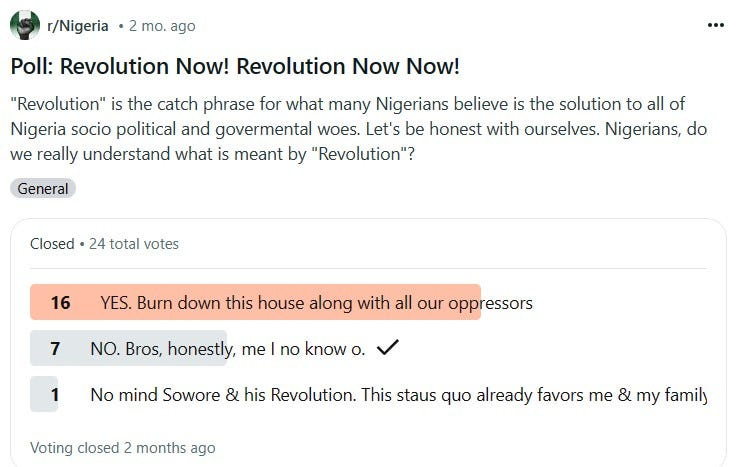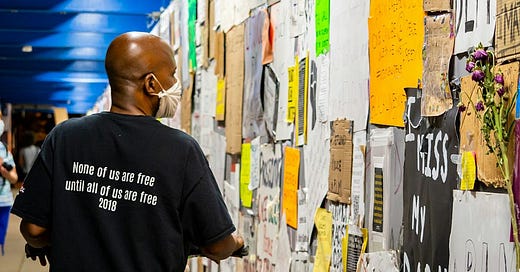Lessons from Saul Alinsky’s Rule for Radicals
“A revolution without a prior reformation would collapse or become a totalitarian tyranny.”

“Revolution Now!”
“Revolution Now Now!”
In my country Nigeria, many believe these catchphrases to be harbingers of solutions to Nigeria’s desert storms of blighting endless socio-political and governmental problems.
What is Political Revolution?
Majority of them don’t know. Others, stubbornly refusing to own up to their ignorance, will rather confuse you with answers to questions you never asked them.
Now, I’m off the first camp, having read Saul Alinsky’s book.
Political Revolution
At peak-engagement hours, the Nigeria Reddit community numbers in the 100s of thousands. But, apathetic as many Nigerians are to anything voting or balloting, their response to my genuine quest was underwhelming.
Was I surprised? No, because I know my people.
Voting is the hallmark of democratic societies. But many Nigerians are skeptics. Their default auto response to voting (any vote) is usually, “Voting won’t change anything now. Why border?”

Enter: Saul David Alinsky
My first sighting of Jerome S. Corsi’s title, Saul D. Alinsky — The Evil Genius Behind Obama (2012) piqued my curiosity. Who was this “evil genius”?
I must find out.
Saul Alinsky died in 1972, aged 63 years. That was before I knew how to read in the English language.
His book, Rules for Radicals — A Pragmatic Primer for Realistic Radicals, came out only a year before he passed away.
In Rules for Radicals, Mr. Alinsky provided a guide on how to effectively organize a movement for change. He persuasively outlined “the difference between being a realistic radical and a rhetorical one.”
“This book is a guidebook for community organizers, to use in uniting low-income communities, or “Have-Nots”, in order for them to gain by any effective, non-violent means social, political, legal, environmental and economic wealth and power.”
The language of communism used in revolutionary literature makes revolution seem synonymous with communism.
Don’t fall for it. Revolution is not synonymous with Communism or Socialism.
3 Groups of People in Every Society
According to Alinsky, societies can be divided into three distinct groups. These are;
The Haves
The Have-Nots
The Have-a-Little, Want Mores
The Haves are at the top. They have the power, money, food, security, and luxury. The Haves want to keep things as they are. They are opposed to change. They are cold and determined to freeze the status quo.
The Have-Nots are at the bottom — and in the majority, chained together by the common misery of poverty, rotten housing, disease, ignorance, political impotence, despair and desperation.
The power of the Have-Nots rests only with their numbers. It has been said that the Haves, living under the nightmare of possible threats to their possessions, are always faced with the question of “when do we sleep?” while the perennial question of the Have-Nots is “when do we eat?”
The cry of the Have-Nots has never been “give us your hearts” but always “get off our backs”; they ask not for love but for breathing space.
The Haves want to keep; the Have-Nots want to get.
Many Have-Nots have given up and resigned to their fate. But there are glowing embers of hope which can be fanned by the building of means of obtaining power.
The power of the Have-Nots rests with their numbers.
Between the Haves and Have-Nots are the Have-a-Little, Want Mores — the middle class. Generally, they seek the safe way, where they can profit by change and yet not risk losing the little they have.
In US and other Western societies the Have-a-Little, Want — Mores are in the majority whereas in non-Western societies (Nigeria included), the Have-Nots are in the majority.
Here is the crux. According to Alinsky,
The clash of interests within the Have-a-Little, Want Mores has bred so many of the great leaders. Tragically, it has also spawned a particular breed stalemated by cross-interests into inaction. These Do-Nothings profess a commitment to social change for ideals of justice, equality, and opportunity, and then abstain from and discourage all effective action for change.
Read on,
They are known by their brand, “I agree with your ends but not your means.”
They function as blankets whenever possible, smothering sparks of dissension that promise to flare up into the fire of action.
These Do-Nothings appear publicly as good men, humanitarian, concerned with justice and dignity. In practice, they are invidious. They are the ones Edmund Burke referred to when he said, acidly: “The only thing necessary for the triumph of evil is for good men to do nothing.
Alinsky’s rules are for those who want to change the world from what it is to what they believe it should be.
Reformation as a Precursor to Revolution
“A reformation means that masses of our people have reached the point of disillusionment with past ways and values. They don’t know what will work but they do know that the prevailing system is self-defeating, frustrating, and hopeless. They won’t act for change but won’t strongly oppose those who do. The time is then ripe for revolution.”
Alinsky wrote, “Knowing these rules makes the difference between being a realistic revolutionary or a rhetorical one. Otherwise, it is impossible to make a pragmatic attack on the system.”
In the context of community organizing, a revolution aims at enabling people, especially the poor, to gain social, political, legal, environmental, and economic power through collective action.
Revoution: What it is
A revolution is not a sudden, violent uprising, but a gradual process of empowering the disenfranchised to press demands upon systems of power.
Alinsky’s approach stems from his belief in using any effective non-violent means to achieving this goal.
If it were possible for the Have-Nots of the world to recognize and accept the idea that revolution did not inevitably mean hate and war, cold or hot, … that alone would be a great revolution in world politics and the future of man.

Key Insights
Revolution is not the same thing as communism. Today, revolution has become synonymous with communism, while capitalism is synonymous with status quo. The reason for this misconception is that in literature, all revolutionary ideas are presented in communist language, causing revolution to be mistakenly associated with communism.
The Primacy of Communication. At all levels, sound communication with the people is non-negotiable. Lack of communication is equivalent to being silent, and throughout history silence has been regarded as assent — in this case, assent to the system.
Start where the world is as it is, and not where you would like it to be. Accepting the world as it is does not in any sense weaken our desire to change it into what we believe it should be. We must begin where the world is if we are going to change it to what we think it should be. That means working in the system.
“Start with small undramatic steps, otherwise, all you will ever get is fruitless confrontation for confrontation's sake. A passive, affirmative, non-challenging attitude toward change among the masses of our people must precede any revolutionary change. They must feel so frustrated, so defeated, so lost, so futureless in the prevailing system that they are willing to let go of the past and chance the future.”
Freedom of speech must never be compromised. “Without a free press and the right of assembly, it is impossible, not merely to appeal to outside opinion, but to bring a mass movement into being, or even to make your intentions known to your adversary.”
Revolution starts from the hearts and minds of people. Meaning “revolution must be preceded by reformation. To assume that a political revolution can survive without the supporting base of a popular reformation is to ask for the impossible in politics.”
Resist the urge for instant and dramatic change. The desire for instant and dramatic change thwarts effective organization. Under the quest for, and the bait of instant change, those who oppose reformation first become unwitting allies of the political right and the oppressors.
Keep the heat on. Use power responsibly and equitably. “Failure to use power for a more equitable distribution of the means of life for all people signals the end of any revolution and the start of the counter-revolution.”
As Alinsky explained it,
The masses of people recoil with horror and say, “Our way is bad, and we were willing to let it change, but certainly not for this murderous madness — no matter how bad things are now, they are better than that.” So they begin to turn back. They regress into acceptance of a coming massive repression in the name of “law and order.”

Saul Alinsky’s 13 Rules for Radicals
Power is not only what you have, but what the enemy thinks you have. Power is derived from 2 main sources — money and people. “Have-Nots” must build power from flesh and blood.
Never go outside the expertise of your people. It results in confusion, fear and retreat. Feeling secure adds to the backbone of anyone.
Wherever possible, go outside the expertise of the enemy. Look for ways to increase insecurity, anxiety, confusion and uncertainty in the enemy’s camp.
Make the enemy live up to its own book of rules. You can kill them with this because even the officers and judges of the law can’t possibly obey all of their own rules.
Ridicule is man’s most potent weapon. It’s infuriating and can cause the opposition to act irrationally to your advantage. The enemy may be forced to make favorable concessions to avoid your infuriating ridicule.
A good tactic is one your people enjoy. They’ll keep doing it without urging and come back to do more. They’re doing their thing, and will even suggest better ones.
A tactic that drags on too long becomes a drag. Keep coming up with new tactics and issues or else the people lost interest and commitment.
Keep the pressure on. Never let up. Keep coming up against the opposition with new tactics and actions to keep them off-balance — all the time.
The threat is usually more terrifying than the thing itself. Dream up or even conjure consequences that may come up because of the other side’s opposition to your stand on issues.
The major premise for tactics is the development of operations that will maintain a constant pressure upon the opposition. Unceasing pressure results in the reactions from the opposition that are essential for the success of the campaign.
If you push a negative hard enough, it will push through and become a positive. Violence from the other side can win the public to your side because the public sympathizes with the underdog.
The price of a successful attack is a constructive alternative. Don’t get caught unprepared with an alternative should the opposition suddenly concede to your demand.
Pick the target, freeze it, personalize it, and polarize it. Focus on clear issues, persons, and targets rather than abstract concepts or institutions.
Some Favourite Quotes
The pursuit of happiness is never-ending; happiness lies in the pursuit.
A major revolution to be won in the immediate future is the dissipation of man’s illusion that his own welfare can be separate from that of all others.
The greatest enemy of individual freedom is the individual himself.
People cannot be free unless they are willing to sacrifice some of their interests to guarantee the freedom of others.
We now live in a world where no man can have a loaf of bread while his neighbour has none. If he does not share his bread, he dare not sleep, for his neighbour will kill him. To eat and sleep in safety, man must do the right thing, if for seemingly the wrong reasons, and be in practice his brother’s keeper.
Afterword
Reading an influential book from a famous community organizer of Saul Alinsky’s calibre won’t transform you into an overnight social activist, organizer, or a successful revolutionary.
Our society will only change for the better when we all step into the game, believing in the possibilities of the changes we want for our societies.
Even though I’ve not yet read it, I’m also aware of Michael Charles Master’s book, Rules for Conservatives: A Response to Rules for Radicals by Saul Alinsky.
Personally, I don’t know if I will agree with Alinsky on everything. I have in mind his take on “the ethics of means and ends” or where he advised organizers to “search for and use the wrong reasons to achieve the right goals.”
My question is, shouldn't we use the right means to achieve the right ends? Should we choose otherwise, won’t we be ushering our societies into those destructive revolutions that Alinsky staunchly opposed?
We need to be ready to interact with the world as it currently exists before we can transform it into a more just and fair place for everyone.
You can at least take this away — that revolution doesn’t mean mass violence trying to topple the prevailing order.
Thanks for your reading time.
If you love writing, join me on Muse2Muse, and let’s grow together.
Plus, you can support my writing by chipping in to buy me a Substack subscription. Click here.
Sources
©Saul D. Alinsky, Rules for Radicals — A Pragmatic Primer for Realistic Radicals, Vintage Books (1989 Edition)
This insight was originally published by the author on Medium.




